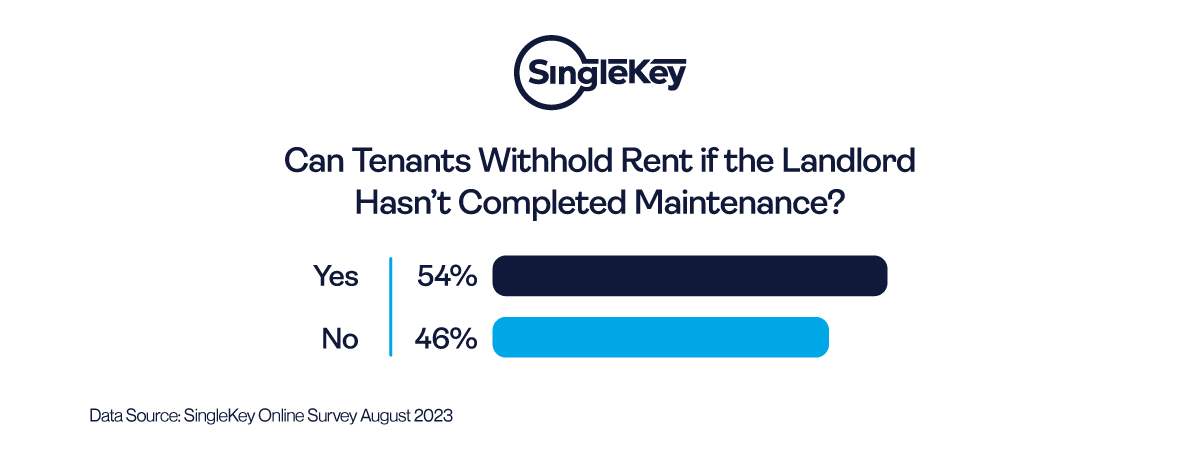Landlord-tenant responsibilities are usually outlined in the lease agreement, but what happens when a landlord fails to meet their maintenance responsibilities in the allotted time?
SingleKey recently surveyed tenants on whether they thought they had the right to withhold rent if a landlord did not follow through with non-critical maintenance. Learn what the respondents had to say.
When is nonpayment of rent warranted?
SingleKey polled over 1,100 people on whether they thought tenants should withhold rent if a landlord failed to complete non-critical maintenance on a property, and over half of the respondents said yes, it was acceptable to withhold rent.
What does non-critical and critical maintenance include?
Maintenance tasks can range from urgent to non-urgent. While landlords should handle all maintenance requests promptly, they may consider some less immediate than others. For instance, if a tenant reports the hot water is not working or there’s a mold infestation in the rental unit, those are the more pressing matters.
Before your renters move in, you should establish who is responsible for certain maintenance responsibilities in the lease terms. Hypothetically, suppose the rental property’s dryer suddenly stops working. In that case, the landlord will likely be responsible for scheduling a repair person to assess the issue. While inconvenient, this is considered a non-urgent maintenance repair. It’s reasonable if the landlord schedules a repair within a week.
Here are examples of repairs and issues that landlords should prioritize:
- Heat and water issues
- Severe mold infestation
- Electrical issues
- Sagging ceiling
- Water leaks or pipe bursts
- Air conditioning repairs
Learn what seasonal maintenance landlords are usually responsible for managing. One essential service that a landlord might take care of is gutter cleaning. If you live in colder climates, the local laws may make landlords and tenants responsible for snow removal, which is seasonal maintenance.
A lease clause regarding what is permitted by state and local laws is also included in the lease terms. If a tenant causes severe and intentional property damage, the landlord may have the right to start an eviction process. An eviction notice is served before the landlord can ask the tenant to move out.
Conversely, if the rental is uninhabitable or the landlord commits a drastic breach of their obligation in the lease term, the tenant can’t technically stop paying rent. However, they can go through the proper channels to end the lease early, report the landlord to the local code enforcement, and potentially damage the property management’s reputation online.
What should be included in the rental agreement
Rental agreements are essential in communicating expectations with your tenants. A rental agreement consists of everything from the due date and amount of monthly rent grace periods for late rent, the rental period or term, the rental property’s address, and the landlord’s and tenant’s maintenance responsibilities.
Procedures for tenants and landlords by region
Beyond what is agreed upon in a residential lease, you are obligated to follow all federal, state, and local laws. In New Jersey, the Division of Housing Codes and Standards states that tenants have a right to habitability in their rental units.
In Ontario, the Residential Tenancies Act states landlords’ and tenants’ code violations and maintenance responsibilities, specifically that a landlord must keep the rental in a “good state of repair.”
In Ohio, if the landlord fails to maintain a habitable condition, a tenant may:
- Make repairs and deduct the amount from the rent
- Abandon premises in a constructive eviction by tenant
In Florida, if the landlord does not complete repairs or maintenance, the rights of the tenant allow them to:
- Abandon premises
- Retain the amount or rent without liability
In California, withholding rent is justifiable if the following repairs are not completed:
- Collapse and non-repair of the bathroom ceiling
- Continued presence of rats, mice, and cockroaches
- Lack of heat and water
- Exposed faulty wiring
- Plumbing blockages
In most states, a landlord cannot commit retaliation against tenants if a tenant files a complaint regarding their residential tenant rights. For example, a landlord cannot terminate a lease without a valid reason or raise the rent suddenly without giving the tenant 30-day notice after the first lease expires.
FAQ: Is rent withholding legal if landlords don’t make repairs?
Tenants do not have the right to withhold rental payments in Texas if landlords have not completed repairs. The landlord has to make necessary repairs within six months to have time to assess the cost of repair and find a professional to complete the project. If a renter reports their landlord in Texas, landlords cannot retaliate against them by taking eviction actions.
Before the landlord can evict or start a nonpayment case in housing court, they must submit a verbal or written rent demand specifying the deadline for the rent payments. A landlord notice for a rent demand typically happens when the tenant fails to pay rent after two to three months.
The landlord will notify the tenant of the maintenance duties they will be responsible for, and they should also be listed in the lease. Landlords are responsible for electrical, leaks, plumbing, heating, air conditioning, major repairs, and sometimes lawn care.
Our final thoughts
The best advice for any landlord is to communicate verbally and in the lease terms what your tenant should expect regarding their maintenance responsibilities. If a tenant reports a complaint or request, be responsive and alert them of a projected timeline of when you plan to complete or assess repairs. Learn more about how to work with your tenant to complete any required maintenance at your rental property.



